Scottish independence: What is a section 30 order?
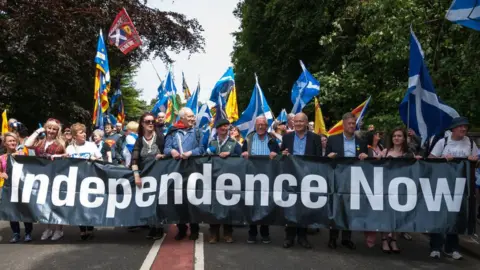 Getty Images
Getty ImagesScottish First Minister Nicola Sturgeon has formally requested powers from Westminster to hold a second independence referendum. What is the process for doing this, and what might happen next?
What is a section 30 order?
Ms Sturgeon wants Scotland to have another vote on independence in 2020 - and she wants the UK government to agree to transfer powers to the Scottish Parliament that would allow this to happen.
This could either be a permanent transfer via an act of the Westminster parliament - Ms Sturgeon has even drawn up a draft - or a more temporary one known as a "section 30 order".
This technical name refers to the section of the Scotland Act that allows Holyrood to pass laws in areas that are normally reserved to Westminster.
These orders have been used 16 times since the devolved Scottish Parliament was created in 1999, and have allowed MSPs to legislate on topics ranging from the construction of railways to reducing the voting age in Scottish elections.
Crucially, a section 30 order was also granted by the UK government ahead of the last independence referendum in 2014 after David Cameron and Alex Salmond - then the prime minister and first minister respectively - signed the "Edinburgh Agreement".
Ms Sturgeon wants to follow the same process for indyref2 to ensure any referendum and its result is seen as legitimate.
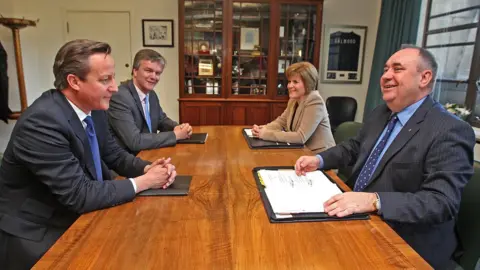 Getty Images
Getty ImagesSo will the UK government grant a section 30 this time?
With Boris Johnson back in Downing Street with a big majority after the general election, the answer appears to be no.
The Conservatives campaigned in Scotland on a platform of opposition to independence, and included a "cast-iron guarantee" in their manifesto that any request for a referendum would be rejected.
Ms Sturgeon argues that this position was "comprehensively defeated", with the Tories losing seven seats amid an SNP landslide north of the border.
But the prime minister has told Ms Sturgeon he "remains opposed" to a new referendum, and that the result of the 2014 vote should be respected.
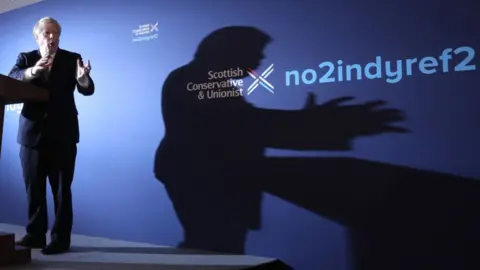 Getty Images
Getty ImagesSo will Mr Johnson change his mind? Might he have a "bring it on" moment, and try to continue his winning run in the same way David Cameron attempted to?
It seems unlikely, for now, given the PM has a lot on his plate fulfilling his other big election pledge - to "get Brexit done".
Could a referendum be held without a deal?
This is a question which has caused considerable debate between legal scholars, but has never actually been tested in court.
There is an argument that Holyrood could potentially legislate for the holding of a referendum - but not actually implement the result, because the power to modify the Acts of Union is reserved to Westminster.
In any case, Ms Sturgeon is clear she has no intention of going ahead without a section 30 order.
Her priority is that a Yes vote be accepted by everyone - in particular the likes of the EU, which an independent Scotland would seek to rejoin - and she has repeatedly ruled out holding an unofficial referendum similar to the one in Catalonia in 2017.
On the practical side, supporters of the union might well boycott any unauthorised referendum, casting doubt on the result.
So one way or another, a transfer of powers is likely to be needed.
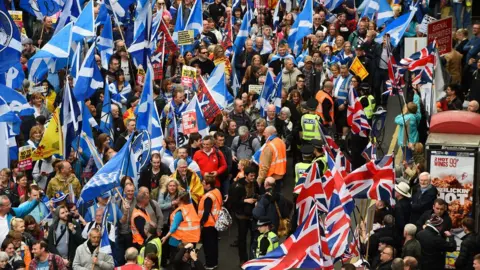 Getty Images
Getty ImagesHow could the deadlock be broken?
Ms Sturgeon has been tight-lipped about this hypothetical question, saying only that the UK government position is unsustainable and that Mr Johnson will ultimately have to agree to a referendum.
But what if he doesn't?
The first minister hasn't ruled out going to court, something various SNP figures are feeling buoyant about following successful Supreme Court challenges on Brexit and the prorogation of parliament.
But it is a risky route, given it would take time and has no guarantee of success.
It's also unclear what point of law would be challenged, given judges would refuse to rule on a political dispute.
One approach could be to pass a specific bill for indyref2 in the Scottish Parliament, effectively tempting UK law officers into challenging it. The end result would be the courts ruling on whether Holyrood is competent to legislate for a referendum or not.
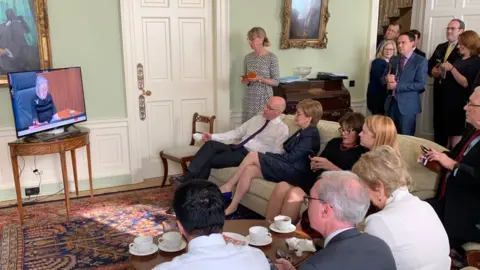 Nicola Sturgeon / twitter
Nicola Sturgeon / twitterAnother possibility would be to use the Scottish Parliament elections in 2021 as leverage, by campaigning specifically on a platform of indyref2 and winning a fresh mandate from the electorate to increase the pressure on the UK government to agree to a section 30.
Before this month's general election came along, many suspected that was the long-term plan.
But this strategy would hold risks too, as the proportional representation system used to elect MSPs makes it difficult for any party to win a majority - although the SNP did manage to do so in 2011.
Even counting on the backing of the pro-independence Greens, could the SNP be confident of a big enough win in the election, having been in power for 14 years?
One final point is that Mr Johnson's continued refusal to allow a referendum might actually boost the independence campaign.
Opinion polls have narrowed, but still generally give a slender lead to the pro-UK side and Ms Sturgeon has always stressed that her goal is not just to hold a referendum, but to win independence.
Ms Sturgeon has warned: "The risk for the Conservatives here is that the more they try to block the will of the Scottish people, the more utter contempt they show for Scottish democracy, the more they are going to increase support for independence."